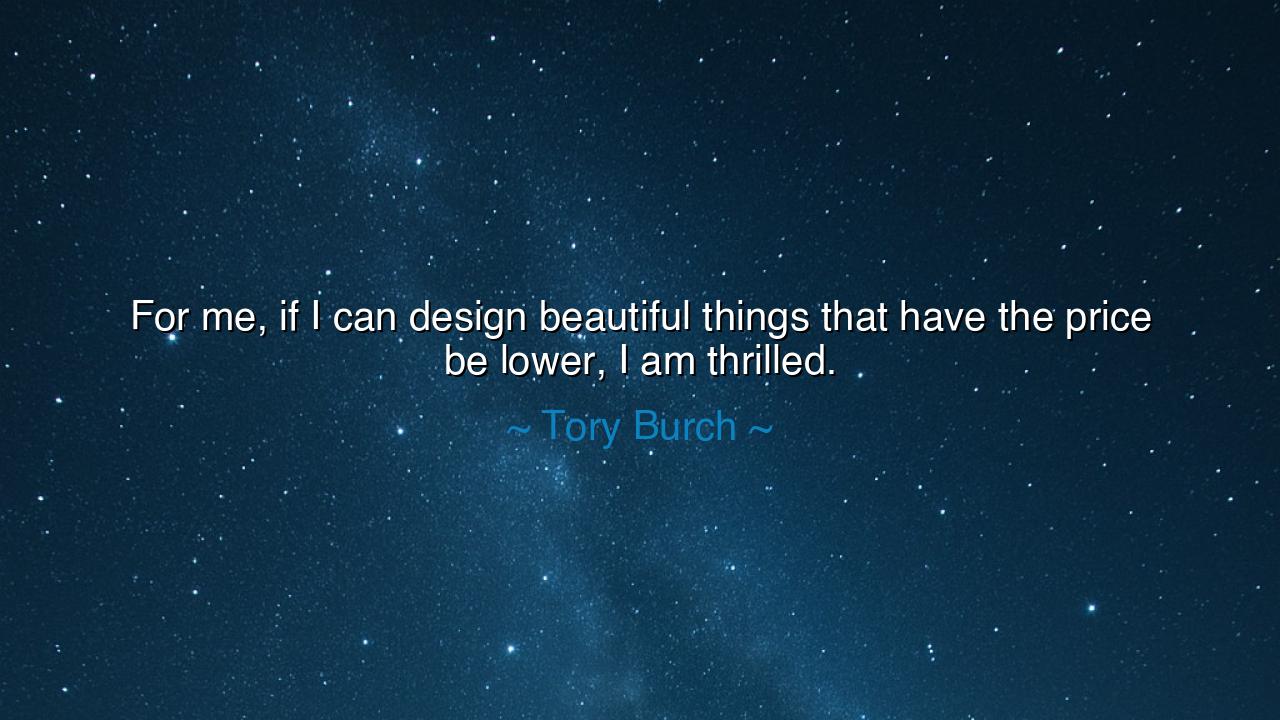
For me, if I can design beautiful things that have the price be






In the gentle cadence of creation, where artistry meets compassion, Tory Burch spoke a truth that transcends the world of fashion: “For me, if I can design beautiful things that have the price be lower, I am thrilled.” Her words are not merely about commerce or cost — they are about democratizing beauty, about ensuring that elegance and joy do not dwell only in the halls of the wealthy, but among all who dream. This statement is a hymn to humility in creation, to the power of giving without pretense, and to the ancient belief that true art serves not the few, but the many.
To create beautiful things is divine, but to make them accessible is sacred. In this quote lies a quiet rebellion against vanity — a declaration that art should not be imprisoned behind the walls of gold. Burch’s joy does not come from exclusivity, but from generosity. Her thrill arises not in selling to the highest bidder, but in opening the gates of design to those who could not otherwise cross them. In that, she mirrors the eternal truth that beauty is not diminished by sharing; it is magnified. The more hands it touches, the more hearts it awakens.
This spirit echoes through the stories of history. Consider William Morris, the craftsman and poet of the nineteenth century, who sought to bring artistry into the homes of ordinary people. He believed that even the humblest household deserved the touch of beauty — that a curtain, a book, or a teacup could lift the human spirit if shaped with care and integrity. Though the industrial world sought speed and profit, Morris sought meaning and dignity in the work of human hands. Like Burch, he understood that beauty, when confined to the privileged, becomes hollow — but when shared, becomes a force of transformation.
So too, in the ancient world, the sculptors of Greece and the builders of temples labored not merely for kings but for the gods — and through that devotion, for all mankind. Their creations stood open beneath the sky, where any soul could look upon them and feel ennobled. They built for eternity, not for exclusivity. This is the same spirit that lives in Tory Burch’s words — the belief that beauty, to be worthy, must uplift the collective heart, not feed the solitary ego.
In her pursuit to lower the price, we hear not a merchant’s calculation, but a philosopher’s compassion. She seeks to bridge the chasm between aspiration and attainment. For what joy is there in creating loveliness if it remains unreachable? True design, like true wisdom, must walk among the people — must adorn the lives of mothers, dreamers, and workers, bringing light into their daily struggle. In this, she teaches that greatness in any art lies not in its price, but in its purpose.
And what lesson, then, do we draw from this? It is that the measure of success is not how much one gathers, but how much one gives. The artist, the teacher, the inventor, and the leader alike must ask themselves: “Do I create for glory, or for good?” For if your creation does not lift others, then it builds only a tower of vanity. But if your work lightens another’s burden, even by an ounce, it becomes sacred labor.
Therefore, O child of craft and vision, when you create — whether a garment, a word, or a life — let your joy be in the giving of beauty. Seek not to dazzle but to serve. Make what you craft a gift to the world, not a mirror of your pride. Lower the barriers between your work and those who long for it, and you will find your thrill not in profit, but in connection. For the highest beauty is not owned — it is shared, and in its sharing, it multiplies forever.






AAdministratorAdministrator
Welcome, honored guests. Please leave a comment, we will respond soon